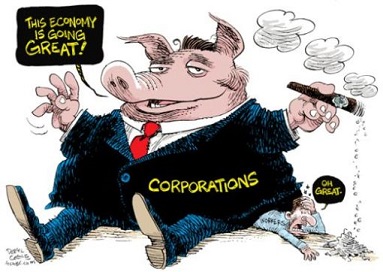
Ask yourself why people need to be forced to buy a product by federal legislation, and who benefits.
On September 10, the US Senate Energy & Public Works Committee approved a new energy bill, S 2754 – the American Innovation and Manufacturing Act, that will cost consumers about $13 billion a year in higher refrigerant costs.
Two companies, Honeywell and Delaware based Chemours, who hold a patent protected HFO product that sells for up to $65 pound, have been actively lobbying Congress to force consumers to use their product over existing products that sell for $3 to $4 a pound.
Both companies also actively lobbied for the same goals in the United Nations’ Kigali Amendment. Fortunately, Obama didn’t have enough votes to have the amendment ratified in the US. Unfortunately for consumers however, Obama ordered the EPA to regulate the new rules into being.
Naturally the EPA complied but since they didn’t have that authority, the US Court of Appeals in DC overturned these new regulations forcing Honeywell and Chemours to once again actively pursue Congress for legislation to force consumers to buy their product. And as we usually see in Congress, money talks loudly.
Two of the prime sponsors of S 2754 are Senators Tom Carper from Delaware, and John Kennedy from Louisiana where Chemours’ production facilities are located.
Don’t let them fool you – This is not about saving the environment – This is about money. Lots of Money. That $13 billion a year in higher consumer costs will end up in the pockets of Honeywell and Chemours less what it cost them to buy a few politicians.
Carper and Kennedy are using a study paid for by none other than Honeywell and Chemours to justify their new bill; a study that claims the new regulations will increase not only our global market but American jobs. What the study didn’t bother to mention is the fact any jobs created through this legislation will only be temporary since both Honeywell and Chemours have located their first plants making HFC substitute refrigerants in China.
Just as earlier bans on ozone-depleting refrigerants provided only short-term profits for American makers of HFCs while giving China the opportunity to dominate the market with cheaper products, so it will be with the HFC substitutes if this bill becomes law. And since it is reasonable to assume that Honeywell and Chemours have already shared this new technology, it will be only a matter of time before Chinese companies start producing their own refrigerants at a far less cost.
Most global demand growth for air conditioning and refrigeration equipment is expected to come from developing nations like India, China, and Indonesia, nations that will want the most affordable equipment, not the pricey eco-friendly versions required under the Act. These nations have already let it be know that they will not undertake a transition to a new class of refrigerants unless the UN paid the added cost through its Multilateral Fund for the Implement of the Montreal Protocol.
American-based companies who believe there is a global market for HFC-alternative refrigerants and equipment do not need the AIM Act to make and export these products. The only thing this bill does is restrict HFCs in the U.S., limit Americans’ choices and shake down American consumers.
The claimed economic, and environmental benefits of the AIM Act simply don’t exist. But GREED, the shameful motive behind the Act, is very real.
The only difference the AIM Act would make is to shield these products from competition from cheaper HFC technologies by pushing the latter out of the market.
Source: Inside Energy by David Stevenson, Director, Caesar Rodney Institute for Energy and Environment; The American Innovation and Manufacturing (AIM) Act: Myth vs. Fact by Ben Lieberman, Competitive Enterprise Institute

